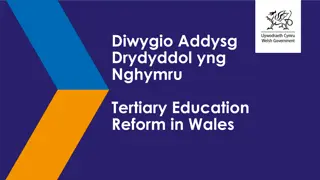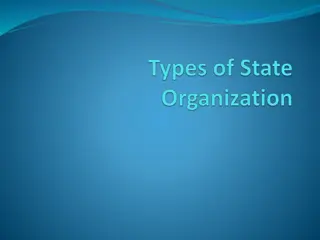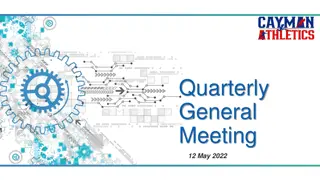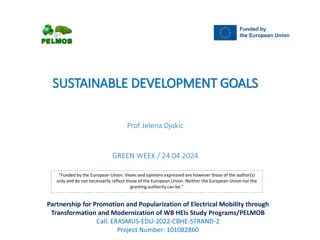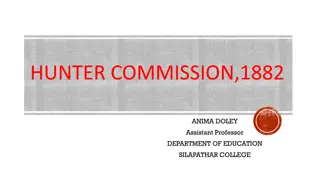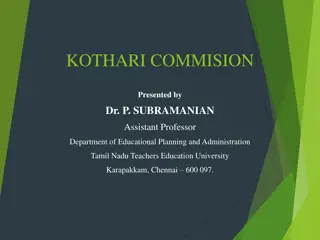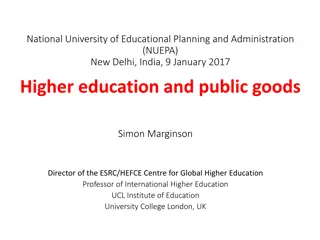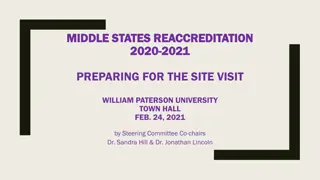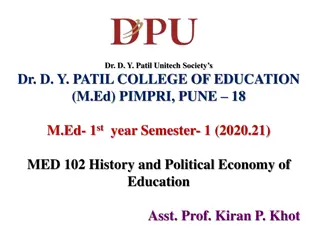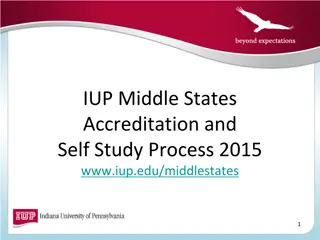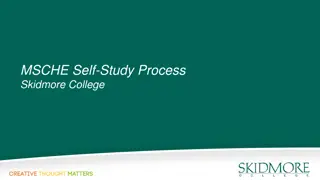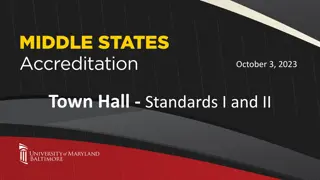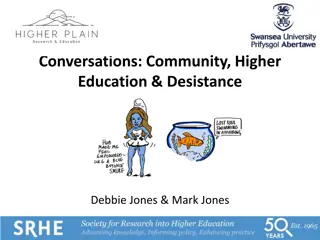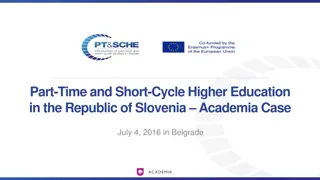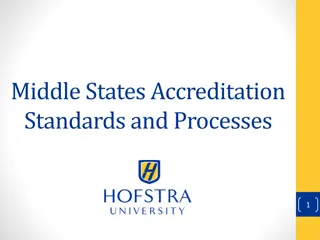Middle States Commission on Higher Education Self-Study Process
The Middle States Commission on Higher Education's self-study process involves organizing the study of institutional mission, goals, and objectives through working groups, drafting the self-study report, receiving feedback, and preparing the final report for accreditation. The mission is to ensure educational quality through peer review and the application of standards. Accreditation signifies institutional commitment to self-assessment and achievement of mission-related goals.
Download Presentation

Please find below an Image/Link to download the presentation.
The content on the website is provided AS IS for your information and personal use only. It may not be sold, licensed, or shared on other websites without obtaining consent from the author. Download presentation by click this link. If you encounter any issues during the download, it is possible that the publisher has removed the file from their server.
E N D
Presentation Transcript
Middle States Update to Presidents Cabinet October 8, 2018 Milestones for Summer 2018 Self-Study Development - Steering Committee co-chairs compiled first draft of full Self-Study Milestones for Fall 2018 Chapters on Standards under review by appropriate constituents Team Chair Visit: Friday October 19, 2018 - Dr. Katherine Conway-Turner, President SUNY Buffalo State College - Gives feedback on draft of Self-Study - Meets with key constituents - Discusses Team Visit logistics Final editing following review of full Self-Study by campus constituents Commission forwards Team members list for our review
The Evolving Self Study Report MSCHE Guidance Institution s Steering Committee organizes the Self Study Process Spring 2017 Working Groups study institutional mission, goals, and objectives through the lens of Commission s Requirements of Affiliation & Standards for Accreditation 9 Working Groups 7 Standards, Communication, & Requirements of Affiliation 2017-2018 Steering Committee develops draft Self Study from reports organized and written by Working Groups Summer 2018 Team Chair Visit to provide feedback on draft Self Study October 19, 2018 (4-6 months before Team Visit) Campus-wide discussion by various institutional stakeholders Fall 2018 Steering Committee prepares final Self Study Report Incorporating Team Chair & campus community feedback end of Fall 2018 Institution disseminates final Self Study Report Submitting 6 weeks (NLT February 22) prior to April 7-10, 2019 Team Visit (p. 30 of MSCHE Self Study: Creating a Useful Process and Report)
The Mission of the Middle States Commission on Higher Education The Middle States Commission on Higher Education assures students and the public of the educational quality of higher education. The Commission s accreditation process ensures institutional accountability, self- appraisal, improvement, and innovation through peer review and the rigorous application of standards within the context of institutional mission (p. 4 of MSCHE Self Study: Creating a Useful Process and Report).
Peer Review and the Accreditation Cycle Accreditation demonstrates an institution's commitment to continuous self-assessment. Based upon the results of a self-appraisal and institutional review by peers and colleagues assigned by the Commission, accreditation attests, in the judgment of the Commission, that an institution: has a mission appropriate to higher education; is guided by well-defined and appropriate mission-related goals, including goals for student learning; has established conditions and procedures under which its mission and goals can be realized; is accomplishing its mission and goals in substantial measure; is organized, staffed, and supported so that it can be expected to continue to accomplish its mission and goals; meets the Standards for Accreditation and Requirements of Affiliation of the Middle States Commission on Higher Education along with relevant federal regulations; and, assesses both institutional effectiveness and student learning outcomes and uses assessment results for improvement (p. 5 of MSCHE Self Study: Creating a Useful Process and Report).
Self Study Evaluation: Standards for Accreditation and Verification of Compliance Self-Study Evaluation The decennial evaluation involves the completion of an institutional Self-Study and a subsequent visit by a team of external peer evaluators. The evaluation includes a process whereby an institution demonstrates that it meets the expectations of the Commission s Requirements of Affiliation, Standards for Accreditation, and relevant federal regulations, and that it evaluates the extent to which it is accomplishing its mission and related goals, making improvements when deemed appropriate by key institutional constituents. Verification of Compliance with Accreditation-Relevant Federal Regulations Institutions are expected to submit documents attesting to their compliance with relevant DoED regulations such as Title IV program responsibilities, student identity verification, transfer credit, credit hour, and other issues. Compliance is validated periodically, typically at the time of Self-Study and during any other evaluation of the institution. Institutions submit information electronically to the Commission; reviewers, selected by the Commission, undertake an off-site evaluation of an institution s compliance with the issues under review (p. 6 of MSCHE Self Study: Creating a Useful Process and Report).
Standards for Accreditation Standards for Accreditation The MSCHE Standards for Accreditation are comprised of the seven standards listed below, which serve as an ongoing guide for those institutions considering application for membership, those accepted as candidate institutions, and those accredited institutions engaged in self-review and peer evaluation. I. Mission and Goals II. Ethics and Integrity III. Design and Delivery of the Student Learning Experience IV. Support of the Student Experience V. Educational Effectiveness Assessment VI. Planning, Resources, and Institutional Improvement VII. Governance, Leadership, and Administration Each standard is expressed in one or two sentences that are followed by criteria. The criteria specify characteristics or qualities that encompass the standard. Institutions and peer evaluators will use these criteria together with the standards, within the context of institutional mission, to demonstrate or determine compliance. (Standards for Accreditation - https://www.msche.org/accreditation/self-study-guide/module-one/ 10-7-18 ). (Requirements of Affiliation https://www.msche.org/standards/#requirements 10-7-18)
Overview of the Self-Study Process (a) The decennial evaluation consists of an extensive institutional Self-Study process that produces a written Self- Study Report. This report and the Commission s Standards for Accreditation and Requirements of Affiliation serve as the basis for on-site evaluation by a team of peer evaluators. During Self-Study, the institution carefully considers its educational programs, policies and services, with particular attention to student learning and achievement, and it determines how well these programs and services accomplish the institution s goals, fulfill its mission, and meet the Commission s Standards. Under the leadership of a Steering Committee appointed by the institution, Working Groups or subcommittees examine existing data and evaluations, gather new information, and prepare analytical reports on their assigned topics. (The term "Working Groups" is used in this handbook to avoid confusion with references to the Steering Committee.) The Steering Committee edits the reports of the various Working Groups, produces a draft for discussion, and disseminates the final Self-Study Report. A broad cross-section of the campus community is expected to participate in each component of the Self-Study process as part of the Steering Committee, the Working Groups, and campus-wide discussions. The Self-Study Report has two sets of audiences and two major purposes. The primary audience is the institution s own community and the secondary audience includes external or public constituencies (p. 8 of MSCHE Self Study: Creating a Useful Process and Report).
Overview of the Self-Study Process (b) The primary purpose of the Self-Study Report is to advance institutional self-understanding and self- improvement. The Self-Study Report, therefore, is most useful when it is analytical and forward- looking rather than descriptive or defensive, when it is used both to identify problems and to develop solutions to them, and when it identifies opportunities for growth and development. Because the decennial Self-Study is a major event in the life of an institution, it should be a useful activity, planned and executed carefully, and not simply a formal exercise. It will be most helpful if the institution implements self-assessment as a continuous process that supports its regular planning cycle (p. 8-9 of MSCHE Self Study: Creating a Useful Process and Report). The second purpose of the Self-Study is to demonstrate to external audiences, such as the Commission, government regulatory agencies, and the public, that the institution meets the Commission s Standards for Accreditation and Requirementsof Affiliation. The Commission s accreditation decision, which follows the Self-Study and onsite visit, is available to the public as part of the Statement ofAccreditation Status (SAS) that the Commission publishes on its website for each of its members. The Self-Study process and report must be meaningful and useful to the members of the institution and must produce evidence of compliance with accreditation Standards. Balancing these two goals is the challenge of an effective Self-Study (p. 13 of MSCHE Self Study: Creating a Useful Process and Report).




